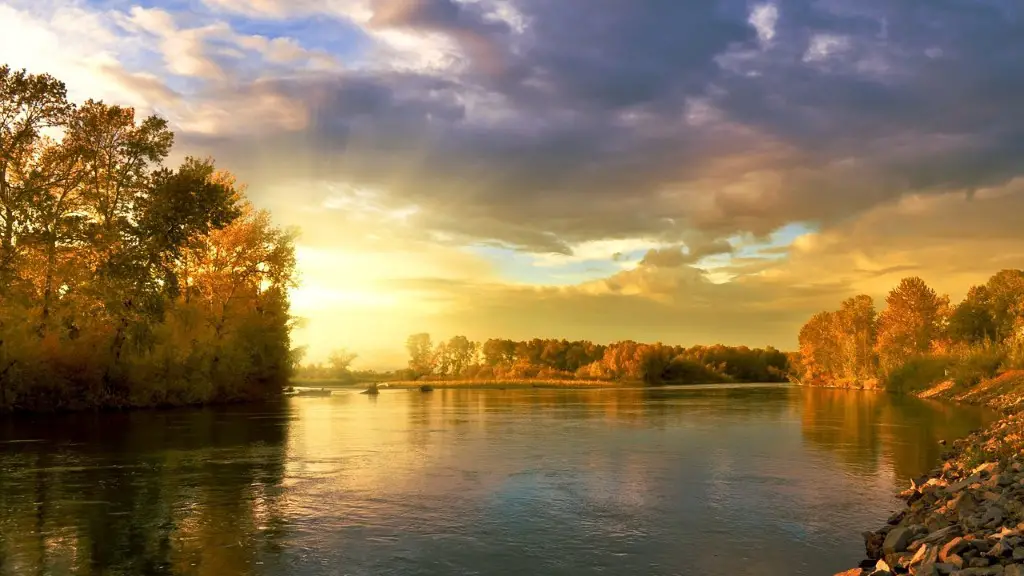Job opportunities & Economic stabilization
The Nile River was of great importance to the Ancient Egyptian civilization, mainly due to its fertile soil and the favorable climate in the areas alongside the river where food could be grown and children could be raised and educated. Additionally, the availability of economic resources, such as trade and transportation, made the river even more essential to the people of ancient Egypt.
Before the Nile, the Ancient Egyptians were dependent on the regular floods of the Nile to provide fertile soil for their crops. The Nile River also acted as a source of fresh water, which was essential to the survival of their people. The Nile provided access to many areas, bringing the Ancient Egyptians into contact with other civilizations, such as the Nubians, Greeks and Romans, that traded items such as wheat, spices, and cloth. These resources were also traded for valuable metals, including gold and silver, further enriching the Egyptians.
The Nile also provided job opportunities for many people in ancient Egypt. The most important of these was the profession of sailing along the river, which meant good wages and the opportunity to travel to far off places. This profession made people in ancient Egypt proficient sailors, which allowed them to transport goods from remote areas and to collect valuable resources from other countries. Additionally, many people were employed in the construction of boats and barges, as well as in fishing and other associated activities along the banks of the river.
The river also brought economic stability to the region, as the various trading activities along the river provided a steady source of income. This further led to the development of many areas, with small settlements along the banks of the Nile growing into cities. This allowed people to access better infrastructure and services, including education, health care, and vocational training, contributing to a higher quality of life in the region.
Ancient monuments & Religious traditions
The Nile River is also important for its role in the development of art and culture in Ancient Egypt. Along its banks, many monuments and religious temples were built, some of which are still standing today. It was believed that the gods resided along the river, and the Egyptians believed that the gods had entrusted them with the duty of building temples in their honor.
The temples of the gods were often built on the banks of the Nile, and by honoring the gods, the people of Ancient Egypt felt that they were in accord with nature. This also developed the belief that the gods were in control of their destiny and that they must follow their laws and customs in order to ensure their safety and prosperity.
Additionally, the river was important in the daily lives of the Ancient Egyptians. It played a role in many religious ceremonies and rites, including offering food and items to the gods, and in many of the festivals that were celebrated along the river. Furthermore, it was a key part of the daily lives of the people of Ancient Egypt, as they used it for fishing and transportation.
Organised military operations and transport
The Nile River was also important for the Ancient Egyptians for military purposes. It enabled them to carry out organized military operations and transport supplies easily. In this regard, it was the river that enabled them to establish their empire, and expand it to the farthest regions of the Mediterranean.
Moreover, it was the Nile that guaranteed the safety of their borders and helped them protect their cities and their lands. The river also enabled the Egyptians to easily transport goods and resources to other parts of the empire, thus allowing them to become a major economic power in the region.
Securing Trade and Resources
Moreover, the Nile was essential for the Ancient Egyptians in terms of trade and resources. It gave them entire control over the trade routes to other regions, thus allowing them to secure their economy. The river was also the main source of resources such as stones, timber, and metals, which were important for the construction of buildings and boats.
The river was also the main avenue through which the Egyptians established relations with other countries and cultures. By controlling the river, they were able to extend their trade routes to distant lands and gain access to resources and goods that would otherwise have been difficult or impossible to obtain.
Preservation of history and culture
Furthermore, the Nile was essential for the preservation of history and culture in Ancient Egypt. It was along its banks where thousands of monuments and temples were built, testifying to the richness and complexity of their culture and beliefs. Moreover, the Ancient Egyptians revered the Nile and saw it as a source of fertility and sustenance, and believed that they owed their success and stability to their close relationship with the river.
Conclusion
In summary, the Nile River was essential to the Ancient Egyptians, both economically, culturally and spiritually. It provided them with the resources,job opportunities and economic stability that enabled them to develop a strong civilization and an extensive empire. The river also allowed them to organize military operations, extend their trade routes and gain access to valuable resources from far off lands. Moreover, the river had a deep spiritual meaning for the people of Ancient Egypt, as their goddesses and gods were closely associated with the river, and it was believed that the province of their gods and goddesses was along the banks of the Nile.

